Permaculture Farming Near Bangalore: Merging Ancient Wisdom with Modern Techniques
Antony Thilak W |
30 December, 2023 |

Introduction
Permaculture farming near Bangalore is at the forefront of an agricultural revolution, where ancient wisdom meets modern techniques. This approach to farming is not only about producing food but also about nurturing ecosystems, preserving traditions, and embracing innovation. In this extensive blog post, we delve into how permaculture farming is harmoniously blending old and new farming techniques in and around Bangalore, making it a model for sustainable agriculture.
The Roots of Agricultural Wisdom
Traditional farming practices around Bangalore have evolved over centuries, deeply rooted in local knowledge and natural cycles. These practices, characterized by an intimate understanding of the land, climate, and local biodiversity, have sustained communities for generations. Permaculture farming respects and draws from this deep well of wisdom, applying it to modern contexts.
Permaculture: A Modern Echo of Ancient Practices
Permaculture, a concept developed in the late 20th century, echoes many principles inherent in traditional farming. It emphasizes working with nature rather than against it, using patterns observed in natural ecosystems to create efficient, self-sustaining agricultural systems. In the farmland near Bangalore, permaculture practices are being tailored to local conditions, marrying traditional knowledge with ecological design.
Water Management: Ancient Techniques in Modern Systems
Water management is critical in the predominantly agrarian landscapes near Bangalore. Ancient techniques such as step-wells and karez (underground canals) are examples of ingenious water conservation that have relevance even today. Permaculture integrates these methods with modern water-saving techniques like rainwater harvesting and drip irrigation, ensuring sustainable water use in farm plots near Bangalore.
Soil Conservation: Blending Old and New Methods
The health of the soil has always been paramount in traditional farming. Practices such as the use of organic manures and crop rotation maintained soil fertility and structure. Permaculture builds on these practices with modern techniques like composting, mulching, and green manures, emphasizing soil conservation and regeneration. For agricultural land near Bangalore, these practices are vital for long-term sustainability.
Crop Diversity: A Tradition Reinforced by Permaculture
Diverse cropping, a hallmark of traditional agriculture, is also a key principle in permaculture. This approach promotes biodiversity, reduces pest problems, and ensures a varied yield. In the context of farm land for sale in Bangalore, incorporating a diverse range of crops and plant species is both a nod to traditional agriculture and a step towards sustainable farming.
Agroforestry: Merging Forestry with Agriculture
Agroforestry, the practice of integrating trees with crops and livestock, is an ancient practice that finds renewed importance in permaculture. Trees provide shade, act as windbreaks, improve soil quality, and offer habitats for wildlife. In the managed farmland near Bangalore, agroforestry systems contribute to ecological balance and diversified income sources.
Pest Management: Natural Solutions from the Past
Traditional farming often employed natural methods for pest control, using plants with pest-repelling properties and encouraging predatory insects. Permaculture enhances these methods with a deeper understanding of ecological balances, promoting a pesticide-free approach to pest management in farm plots near Bangalore.
Seeds and Heritage: Preserving Genetic Diversity
Seed saving, a practice integral to traditional farming, is crucial in permaculture for preserving genetic diversity and ensuring seed sovereignty. This practice is especially relevant for those looking to buy farmland near Bangalore, where maintaining local crop varieties is essential for food security and cultural preservation.
Community Involvement: The Cornerstone of Sustainable Farming
Community involvement and knowledge sharing are central to both traditional farming and permaculture. In the areas near Bangalore, community-driven initiatives like seed banks, cooperative farming, and educational workshops strengthen the social fabric and promote sustainable practices.
Adapting to Modern Challenges
While permaculture respects and utilizes ancient wisdom, it also adapts to modern challenges such as climate change, resource depletion, and urbanization. For agricultural land near Bangalore, permaculture offers resilient and adaptable farming techniques that address contemporary environmental concerns.
Training and Capacity Building
Training programs and workshops are essential in bridging the gap between traditional knowledge and modern permaculture techniques. These programs equip farmers with the skills and understanding to implement sustainable practices effectively.
The Future of Farming Near Bangalore
As Bangalore and its surrounding areas continue to evolve, permaculture farming stands as a testament to the harmonious blending of the old and the new. It presents a sustainable and resilient model for agriculture that respects the past, addresses current challenges, and prepares for future needs.
Conclusion
Permaculture farming near Bangalore represents a confluence of ancient agricultural wisdom and modern sustainable techniques. By embracing the best of both worlds, it offers a viable, productive, and environmentally friendly approach to agriculture. This fusion not only enhances the sustainability of farming practices but also ensures the preservation of local traditions and ecological health, paving the way for a greener and more sustainable future in agriculture.
